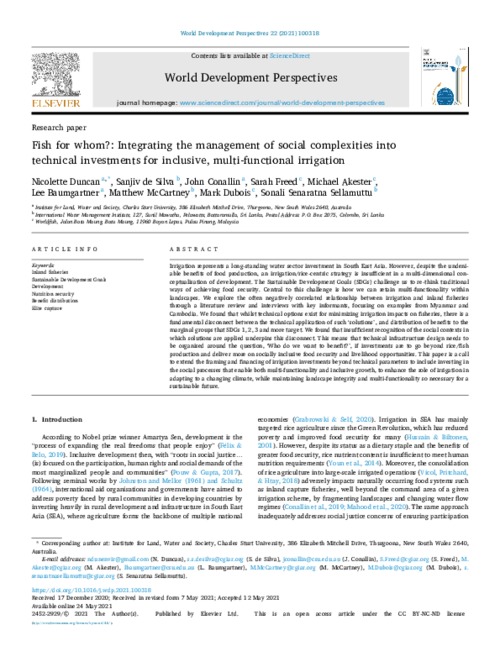Fish for whom?: Integrating the management of social complexities into technical investments for inclusive, multi-functional irrigation

Irrigation represents a long-standing water sector investment in South East Asia. However, despite the undeni-able benefits of food production, an irrigation/rice-centric strategy is insufficient in a multi-dimensional con-ceptualisation of development. The Sustainable Development Goals (SDGs) challenge us to re-think traditional ways of achieving food security. Central to this challenge is how we can retain multi-functionality within landscapes. We explore the often negatively correlated relationship between irrigation and inland fisheries through a literature review and interviews with key informants, focusing on examples from Myanmar and Cambodia. We found that whilst technical options exist for minimizing irrigation impacts on fisheries, there is a fundamental disconnect between the technical application of such ‘solutions’, and distribution of benefits to the marginal groups that SDGs 1, 2, 3 and more target. We found that insufficient recognition of the social contexts in which solutions are applied underpins this disconnect. This means that technical infrastructure design needs to be organised around the question, ‘Who do we want to benefit?’, if investments are to go beyond rice/fish production and deliver more on socially inclusive food security and livelihood opportunities. This paper is a call to extend the framing and financing of irrigation investments beyond technical parameters to include investing in the social processes that enable both multi-functionality and inclusive growth, to enhance the role of irrigation in adapting to a changing climate, while maintaining landscape integrity and multi-functionality so necessary for a sustainable future.
Permalink
Date Available
Type
Publisher
ISSN
2452-2929
Copyright
CC-BY-NC-ND-4.0
Research Themes
Language